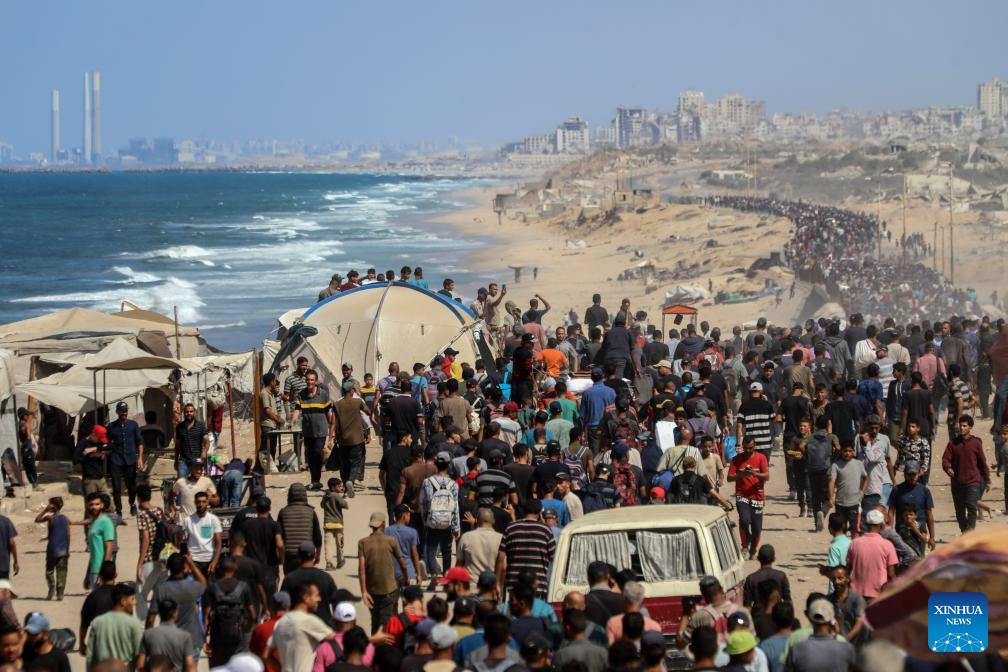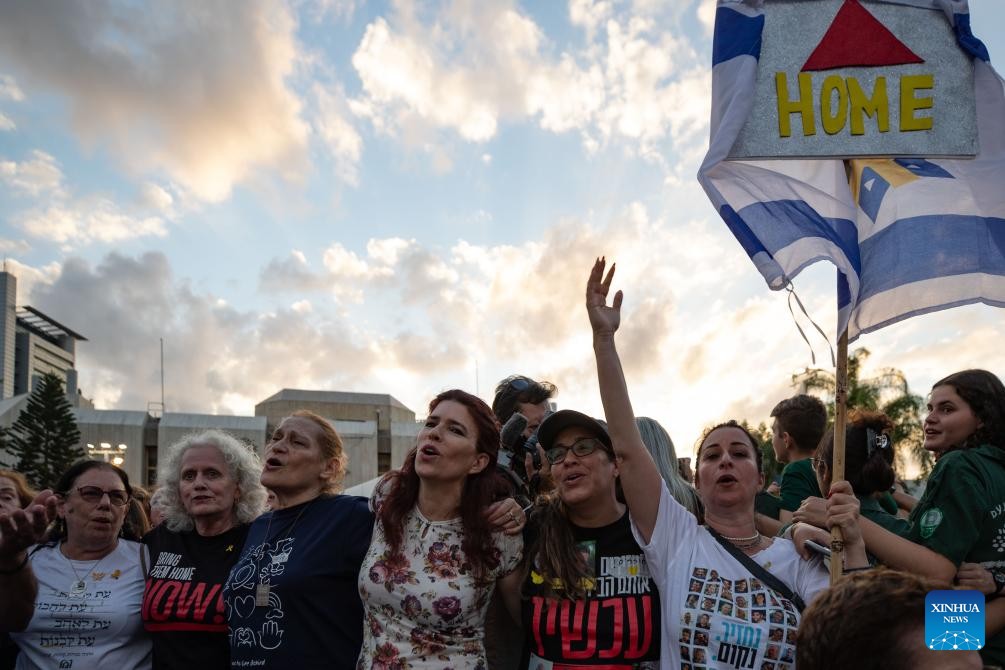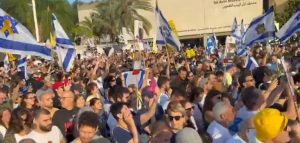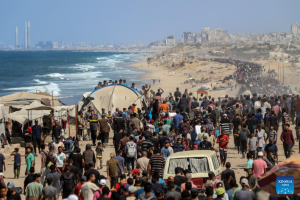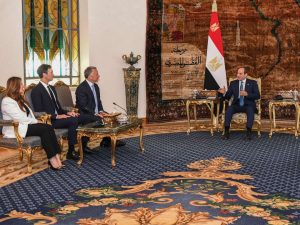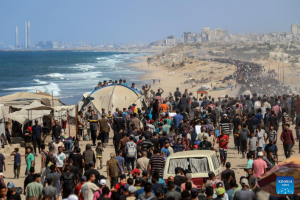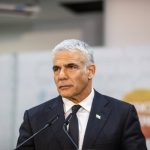Netanyahu also signalled that there is no end in sight for the grinding war in Gaza….reports Asian Lite News
Israeli Prime Minister Benjamin Netanyahu said Sunday that the current phase of fighting against Hamas in Gaza is winding down, setting the stage for Israel to send more troops to its northern border to confront the Lebanese militant group Hezbollah.
The comments threatened to further heighten the tensions between Israel and Hezbollah at a time when they appear to be moving closer to war.
Netanyahu also signalled that there is no end in sight for the grinding war in Gaza.
The Israeli leader said in a lengthy TV interview that while the army is close to completing its current ground offensive in the southern Gaza city of Rafah, that would not mean the war against Hamas is over. But he said fewer troops would be needed in Gaza, freeing up forces to battle Hezbollah.
“We will have the possibility of transferring some of our forces north, and we will do that,” he told Israel’s Channel 14, a pro-Netanyahu TV channel, in an interview that was frequently interrupted by applause from the studio audience. “First and foremost, for defence,” he added, but also to allow tens of thousands of displaced Israelis to return home.
The Iranian-backed Hezbollah began striking Israel almost immediately after Hamas’ October 7 cross-border attack that triggered the Gaza war.
Israel and Hezbollah have been exchanging fire nearly every day since then, but the fighting has escalated in recent weeks, raising fears of a full-blown war.
Hezbollah is much stronger than Hamas, and opening a new front would raise the risk of a larger, region-wide war involving other Iranian proxies and perhaps Iran itself that could cause heavy damage and mass casualties on both sides of the border.
White House envoy Amos Hochstein was in the region last week meeting with officials in Israel and Lebanon in an effort to lower tensions. But the fighting has continued.
Netanyahu said he hoped a diplomatic solution to the crisis could be found but vowed to solve the problem “in a different way” if needed. “We can fight on several fronts and we are prepared to do that,” he said.
He said any deal would not just be “an agreement on paper.” He said it would require Hezbollah to be far from the border, an enforcement mechanism and the return of Israelis back to their homes. Tens of thousands of people were evacuated shortly after the fighting erupted and have not been able to go home.
Hezbollah has said it will continue battling Israel until a cease-fire is reached in Gaza. The group’s leader, Hassan Nasrallah, warned Israel last week against launching a war, saying Hezbollah has new weapons and intelligence capabilities that could help it target more critical positions deeper inside Israel.
Hezbollah already has unveiled new weapons during the low-level fighting, including hard-to-defend attack drones that strike with little warning. An Israeli soldier was badly wounded Sunday in a drone strike.
But Israel says it too has shown Hezbollah only a small part of its full capabilities, and that Lebanon will be turned into a second Gaza if there is a war. Israel’s army last week said it had “approved and validated” a new plan for a Lebanon offensive.
In the interview, Netanyahu said that Israel’s offensive in Gaza is winding down. The Israeli army has been operating in the southern border town of Rafah since early May.
It says it has inflicted heavy damage on Hamas in Rafah, which it has identified as the last remaining Hamas stronghold after a brutal war stretching nearly nine months. But he said Israel would have to continue “mowing” operations — targeted strikes aimed at preventing Hamas from regrouping.
Israel launched its air and ground invasion of Gaza immediately after Hamas’ October 7 attack, which killed some 1,200 people and took about 250 others hostage.
The Israeli offensive has killed over 37,000 Palestinians, unleashed a humanitarian crisis and triggered war crimes and genocide cases at the world’s top courts in The Hague.
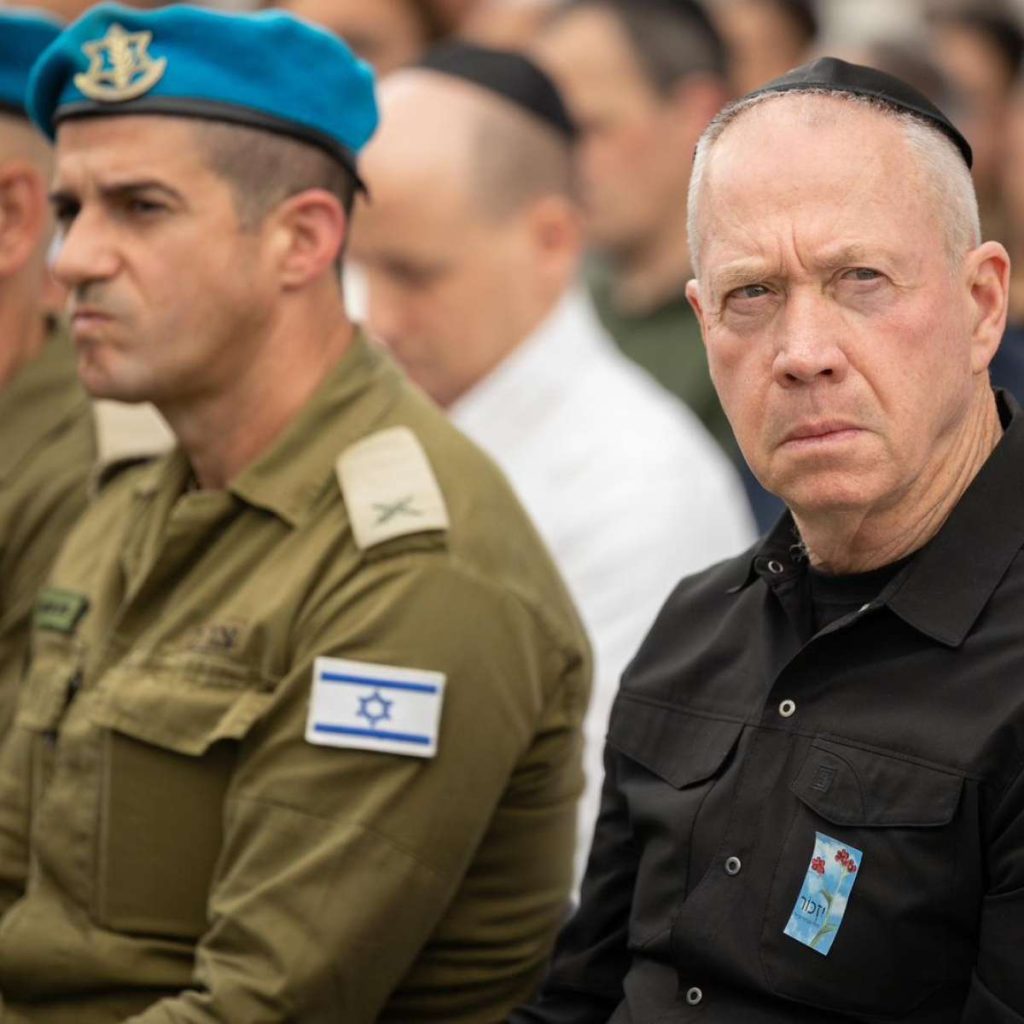
Israel defense chief to discuss Gaza, Lebanon on US trip
Israel’s defence minister has flown to meet senior Biden administration officials in Washington for what he has described as “critical” talks over the twin conflicts with Hamas in Gaza and Hezbollah in Lebanon.
Yoav Gallant, accompanied by the Israel Defense Forces’ deputy chief of staff, will meet the US defence secretary, Lloyd Austin, as well as the secretary of state, Antony Blinken, and Joe Biden’s special envoy, Amos Hochstein.
Gallant’s visit came as Israel’s prime minister, Benjamin Netanyahu, repeated his claim that the Biden administration was presiding over a “dramatic drop” in arms shipments to Israel in recent months, a charge that has angered US officials, who have described it as “perplexing”.
In a statement on Sunday, Netanyahu reiterated his resistance to ending the war in Gaza – one of Hezbollah’s conditions for de-escalation – while Hamas is still in place.
Describing his visit, Gallant said: “During these meetings I plan to discuss developments in Gaza and Lebanon. These [discussions] are particularly important and impactful at this time. We are prepared for any action that may be required in Gaza, Lebanon and in additional areas.”
Some Israeli officials have linked a push into Rafah, the southern area of Gaza, where it says it is targeting the last battalions of Hamas, to a potential refocus on the border with Lebanon, where escalating exchanges of fire between Israel and Hezbollah have increased fears of a wider war there.
Gallant appeared to make the same link in his statement. “The transition to phase C in Gaza is of great importance. I will discuss this transition with US officials, how it may enable additional things, and I know that we will achieve close cooperation with the US on this issue as well,” he said.
On Sunday, the chairman of the joint chiefs of staff warned that an Israeli offensive in Lebanon had the potential to increase the risk of a broader conflict that draws in Iran and Iran-aligned militants.
“Hezbollah is more capable than Hamas as far as overall capability, number rockets and the like. And I would just say I would see Iran be more inclined to provide greater support to Hezbollah,” air force general Charles Q Brown told reporters.
Amid concerns that fighting with Hezbollah could escalate into a wider war, the group’s leader, Hassan Nasrallah, repeated threats that his movement would strike widely throughout Israel.
The Lebanese armed group on Saturday evening published a video showing Israeli positions and coordinates, along with an excerpt of a speech last week in which Nasrallah said: “If war is imposed on Lebanon, the resistance will fight without restrictions or rules.”
As exchanges continued between the two sides, air alarms were triggered on Sunday morning in Israel’s Lower Galilee after a Hezbollah drone was intercepted in the Misgav region south of the city of Karmiel, near a defence factory, farther south than in previous attacks.
Early on Sunday, Israel also intercepted a drone outside its airspace that had been launched by an Iran-allied group in Iraq, as it was reported that other Iran-allied groups in the region had offered to send fighters to support Hezbollah in the event of a wider war.
ALSO READ: No normalization with Israel soon, says Saudi envoy to UK



